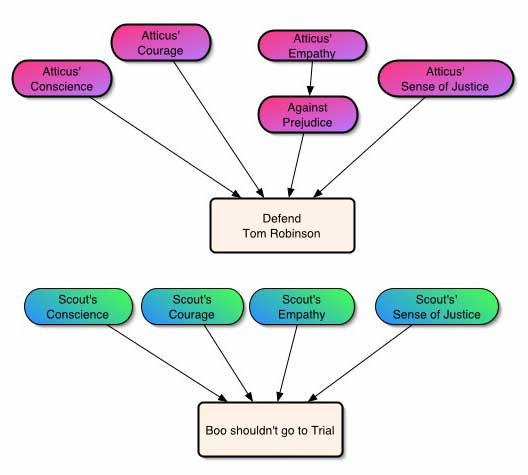Wow, that was some great tech service from Omni, especially considering I was using a trial version. I went out and purchased OmniGraffle immediately. Here’s the graph I was working on in trying to write The Mockingbird essay.
As you can tell, there are some problems with parallel structure. Nor am I sure all my causal links are truly causal links. At least it gives me some ways to start writing. Better than looking at an empty page.

Oops, Stuck Out Here Again
When I used to teach writing courses and students would say that they had “writer’s block,” I would tell them to just keep writing and something would come out. (Of course, I didn’t bother to tell them it might be pure bullshit, but I’d read too many student papers not to realize that possibility)
Maybe that’s why it’s hard to take my own advice. But, if the truth be known, I’m stuck. I’m within a few pages of finishing To Kill a Mockingbird, and I‘ve been thinking about it for days. I even followed Jeff Ward’s example and tried making a flow chart, but that has created its own problems.
First of all, I’m not sure how ideas are connected in the novel, or even if they are connected. I think one of the weaknesses of INTP’s is that they want things to be connected, even if they really aren’t connected at all. But believing that there must be a causal relationship when there isn’t one is probably as wrong as assuming there is no relationship when there really is.
Second of all, OmniGraffle is new to me and I haven’t been able to make it export the chart to something I could post on my blog. I even did the unheard of and emailed support to see if there was something I was missing. Of course, I still haven’t gotten a reply back. However, this has become its own obsession, providing me with another excellent excuse not to write an entry for my blog.
See how easy it is to avoid the real question?
The truth is maybe I care too much about To Kill a Mockingbird to just write about it. I invested too much energy in teaching it to take it lightly. If I could only require one book to be taught in high school, I think that book would be To Kill a Mockingbird. It contains the values that I would like every student to have when they left school, with perhaps a few that I would just as soon they didn’t have.
Since I started reading this novel to write a defense of it for the Banned Book Week, I’ve also seen the novel in some new ways, seen some things I just glossed over the first four or five times that I read it. In trying to be “objective” I’ve found some things I’m sure that would offend certain people, people I would probably disagree with, of course, and I’ve even found a few things that offend me.
When I used to teach this novel, I taught it thematically. I emphasized what I considered the most important themes in the novel. It’s relatively easy to pick out important themes in the story. It turns out, though, that it’s much harder to tie them all together.
Lately it’s been easier to read other people’s weblogs and write short comments than write anything here. (Have you ever wondered why wood s lot doesn’t have comments? I mean, I could do some serious commenting on his page.)
However, after reading Jonathan Delacour’s comments on Burningbird’s comments on Doc Searles, I might have put my foot in my mouth without realizing it. I only glance at Doc’s page occasionally and obviously didn’t have the background Jonathon had to put the comments in perspective. Personally, I read the comment entirely different than most people and, after reading the columns referred to, felt insulted that saying these were the "smartest babes" on the web was an insult to those intelligent women writers I link to in that column over there on the left. Actually, I still feel that way, but I was still taking Doc Searles’ comments out of context.
Maybe running around commenting on other people who are able to write isn’t the best use of my time, but heck since I’m not getting paid for this there’s no one here to keep me on track.
I’m trying to get back on track, but the train seems to have left the station without me and I’ve got those lonesome writer’s blues.

